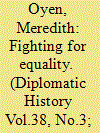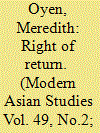|
|
|
Sort Order |
|
|
|
Items / Page
|
|
|
|
|
|
|
| Srl | Item |
| 1 |
ID:
132027


|
|
|
|
|
| Publication |
2014.
|
| Summary/Abstract |
An early battle in the war to gain greater equality for China on the international stage emerged in an unexpected place: Aboard ships around the world sailing for the Allied Merchant Marine. During the Second World War, at least twenty thousand Chinese seamen worked on mostly British ships. Chinese worked long hours, received lower wages than white sailors engaged in the same work, were never given the war risk bonus offered to keep other members of the crew on duty during periods of high risk, and were routinely denied shore leave at U.S. ports on the grounds that they posed a flight risk. In response, Chinese seamen deserted in uniquely high rates, en masse instead of one individual at a time. The nature and scope of the desertions threatened the success of the supply operation, leading the governments involved to come together to try to prevent them.This article explores the multilateral negotiations that endured as long as the war itself. These centered upon three of the most basic inequalities endured by Chinese sailors-unequal pay, lack of war risk bonuses, and lack of shore leave. Using government records from all three parties (the United States, Great Britain, and the Republic of China) as well as press and collections from private organizations, I demonstrate the ways in which racial inequalities ingrained in the international system hindered advances for the Chinese seamen, challenged the smooth management of both Anglo-Chinese and Chinese-American relations, and sparked conflict between the Nationalist Chinese government and the seamen themselves. The legacies of British colonialism in Asia and American exclusion of Chinese combined with wartime public opinion to push forward changes when international union efforts failed.
|
|
|
|
|
|
|
|
|
|
|
|
|
|
|
|
| 2 |
ID:
139682


|
|
|
|
|
| Summary/Abstract |
This article examines the rise of the international refugee regime in Asia, focusing on the work of the International Refugee Organization in repatriating overseas Chinese from mainland China back to their homes in Southeast Asia from 1947 to 1956. It looks both at how the International Refugee Organization inherited this repatriation project from its predecessor—the United Nations Relief and Rehabilitation Administration—and its survival after a civil war installed a new, Communist government on the Chinese mainland. Doing so reveals the extent to which both Chinese governments had to rely on outside assistance to fulfil an important task of maintaining positive ties between Chinese abroad and the homeland. Using research from the Ministry of Foreign Affairs archives in Beijing and Taipei, as well as records from relevant parties in the British and American governments, this article places the repatriation programme and the larger efforts of the International Refugee Organization in Asia in a broader context of regional foreign relations and the origins of the Cold War.
|
|
|
|
|
|
|
|
|
|
|
|
|
|
|
|
| 3 |
ID:
180335


|
|
|
|
|
| Summary/Abstract |
The pandemic of 2020 brings the field of American foreign relations, or the United States and the World, or the global history of international relations, to an important crossroads. The pandemic will have a direct impact on the ongoing trend in the field toward transnational (read: multilingual, multi-archival, globe-trotting) research. Closed borders and heightened tensions will limit access to archives, conference interactions, and routine scholarly exchanges. At the same time, caregiving responsibilities and challenging economic conditions for both universities and individual households will determine whose research is most detrimentally affected by COVID-19 shutdowns, and in many cases, limit participation by some of the very same groups whose voices SHAFR has been seeking to amplify in its push for diversity.
|
|
|
|
|
|
|
|
|
|
|
|
|
|
|
|
|
|
|
|
|